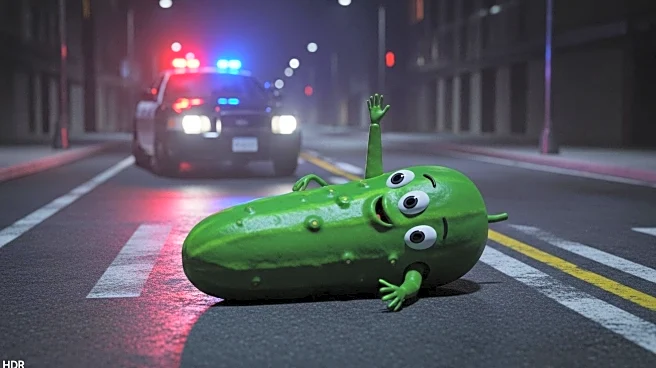What is the story about?
What's Happening?
A video that circulated widely on social media in early October 2025, purportedly showing police officers chasing a person in a pickle costume, has been confirmed as fake. The footage, which appeared to be recorded from a helicopter or drone, was shared across platforms like YouTube, Instagram, and Reddit. It was accompanied by comments referencing President Trump's America, where unusual protests against law enforcement have been noted. The video was generated using Sora, an advanced AI model developed by OpenAI, which creates video and audio content from user prompts. The video included a watermark from Sora, indicating its AI origin, and was shared by a TikTok channel known for posting similar AI-generated content. The video featured several telltale signs of AI manipulation, such as inconsistent visual elements and disappearing body parts, confirming its artificial nature.
Why It's Important?
The proliferation of AI-generated content like the pickle costume video raises significant concerns about misinformation and the ability to distinguish real events from fabricated ones. As AI technology becomes more sophisticated, the potential for creating realistic yet false narratives increases, posing challenges for media consumers and law enforcement. This incident highlights the need for improved digital literacy and verification tools to identify AI-generated content. The impact on public perception and trust in media is profound, as such videos can influence opinions and incite reactions based on false premises. Stakeholders, including tech companies and policymakers, must address the ethical implications and develop strategies to mitigate the spread of misleading AI-generated media.
What's Next?
As AI-generated content continues to evolve, platforms like TikTok and other social media networks may need to implement stricter guidelines and technologies to identify and label AI-generated media. OpenAI's decision to include visible watermarks on its AI outputs is a step towards transparency, but further measures may be necessary to prevent the spread of misinformation. Policymakers might consider regulations to ensure accountability and traceability of AI-generated content. Additionally, public awareness campaigns could be launched to educate users on recognizing AI manipulations and understanding their potential impact on society.
Beyond the Headlines
The rise of AI-generated content poses ethical questions about the use of technology in creating deceptive media. It challenges traditional notions of authenticity and reality, prompting discussions on the role of AI in shaping cultural narratives. The legal implications of AI-generated misinformation, including potential defamation or incitement, may require new frameworks to address accountability. Furthermore, the cultural impact of such content could influence societal norms and expectations, as AI blurs the lines between fiction and reality.















